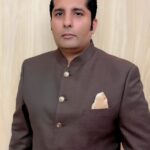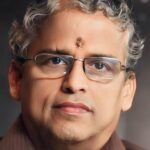Prof. (Dr.) M. Wali, Padma Shri awardee and one of India’s most distinguished physicians, has devoted his life to advancing medicine, saving lives, and raising awareness about pressing health concerns. A graduate and gold medalist from GSVM Medical College, Kanpur, Dr. Wali earned his MD in Medicine there as well and went on to become one of the most celebrated alumni of Kanpur University. His early brilliance was evident as he secured distinctions in all subjects during MBBS, along with the Chancellor’s Medal for Best Student and Best Thesis in MD (Medicine). Over the years, his extraordinary journey as a physician, teacher, and researcher has been marked by countless accolades, but above all, by his unwavering service to humanity.
Dr. Wali’s professional path began when he joined the Central Health Service (CHS) in 1980, where he worked tirelessly before moving to Sir Ganga Ram Hospital, New Delhi, where he continues as a senior consultant. His academic pursuits and commitment to excellence led him to write 124 research papers in national and international journals and contribute to over 20 textbooks on cardiology, medicine, and hypertension. His research on renovascular hypertension at the Mayo Clinic between 2004 and 2006 remains a milestone in his career. He has also promoted Ayurveda and chaired the committee on AYUSH at the Ministry of Health and Family Welfare, embodying his integrative approach to medicine.
Honoured with a Doctor of Science degree from Germany, Dr. Wali has been awarded fellowships from the American College of Cardiology, the University of Michigan, and most recently, the Royal College of Physicians, Glasgow. His contributions earned him the Presidential Gold Medal of the Indian Red Cross, presented by Bharat Ratna Shri Pranab Mukherjee. Among his many awards are the prestigious Indian Red Cross Medal, the Medical Ikon Award, multiple “Best Specialist” recognitions by the Union Health Minister, and Lifetime Achievement Awards in 2017, 2019, and 2024. His crowning achievement, however, is the unique honour of serving as the personal physician to three Presidents of India—R. Venkataraman, Dr. Shankar Dayal Sharma, and Pranab Mukherjee—as well as treating former Prime Minister V. P. Singh. Few physicians can claim such a rare trust and responsibility.
Even with these distinctions, Dr. Wali remains deeply committed to public health issues. Recently, his voice has been at the forefront of raising awareness about Sudden Cardiac Death (SCD), an alarming condition increasingly affecting India’s youth. Once thought to be confined to the elderly or chronically ill, SCD now strikes athletes, actors, professionals, and even schoolchildren—often without warning. “Dil T Pagal Hai,” as he poignantly titled his note, highlights how lifestyle changes, stress, poor diet, lack of physical activity, and post-COVID complications have combined to make seemingly healthy individuals vulnerable.
Medically, SCD can be triggered by myocardial infarction, arrhythmias like ventricular fibrillation, hypertrophic cardiomyopathy, and even rare conditions like Commotio Cordis or Kounis Syndrome. Genetic predispositions—such as those seen in Romano-Ward or Brugada syndromes—further underscore the hidden risks. Post-COVID complications, including polycythemia and microclotting, have introduced new dimensions to the problem, with thromboelastography (TEG) emerging as a critical diagnostic tool.
India’s demographic reality makes this crisis even more urgent. With over 7 million annual deaths in the country, SCD is estimated to account for more than 700,000 fatalities each year, many of them among the economically productive age group. A recent Indian study noted that more than half of the victims had no conventional risk factors. The loss of well-known figures like actor Rituraj Singh, singer KK, journalist Rohit Sardana, and international sports stars such as Luis Tejada and Zhang Zhijie has drawn public attention, but the tragedy extends silently to countless ordinary families.
Dr. Wali emphasizes that prevention must be multifaceted. Lifestyle changes—such as balanced intake of antioxidants, Omega-3 fatty acids, and natural anti-inflammatory compounds like curcumin and resveratrol—are critical. Walking in natural surroundings, forest bathing, intermittent fasting, and minimizing processed foods can strengthen cardiovascular resilience. At the same time, awareness of early symptoms such as chest pain, unexplained breathlessness, sweating, or fainting must be heightened, especially since women often present with subtler signs.
Equally important is timely emergency response. Administering CPR and deploying an automated external defibrillator (AED) within minutes can save up to 40% of lives. Countries experimenting with drone-delivered AEDs have shown promising outcomes, and Dr. Wali advocates for similar innovations and public training in India. His call extends beyond hospitals to schools, offices, and communities, making cardiac safety a shared responsibility.
Today, as a senior consultant at Sir Ganga Ram Hospital, Dr. Wali continues his dual mission—providing world-class medical care while also raising awareness about preventable health crises. His present focus on tobacco harm reduction further reflects his proactive approach to tackling lifestyle-related risks. With decades of service, a legacy of awards, and an unmatched dedication to patient care, Prof. (Dr.) M. Wali embodies the role of a physician as healer, teacher, and guide.
At a time when sudden cardiac deaths are on the rise and non-communicable diseases continue to burden society, his words pose a sobering yet necessary question: What exactly is happening to our hearts—and why?
*******************************


